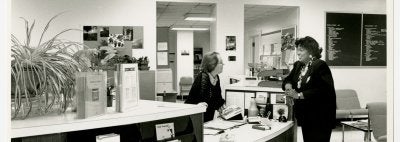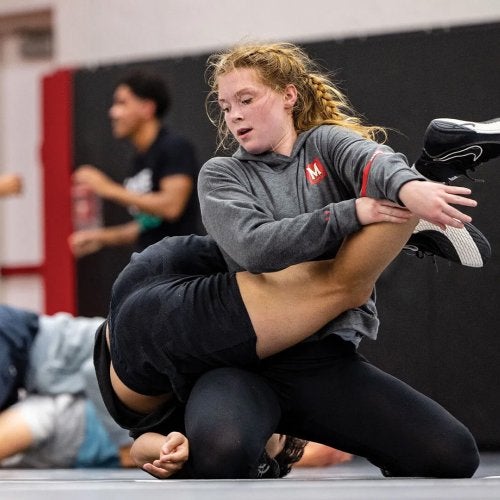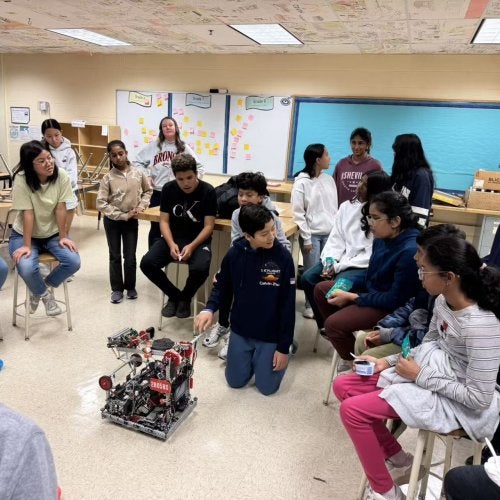

Benjamin Broadcast Episode 2: Culture Eats Strategy for Breakfast
The second episode of the Benjamin Broadcast examines what the college has done to advance diversity and inclusion on campus, with guests Dr. Vivian Boyd (Ph.D. '75), Dr. Sharon Fries-Britt, and COE doctoral student Autumn Griffin.
Be sure to tune in regularly for new episodes of COE's Benjamin Broadcast, available here, and on SoundCloud. A transcription of the Benjamin Broadcast 'Culture Eats Strategy' episode is available below. Enjoy!
Benjamin Broadcast Episode 2 Script
Podcast music intro
LAUREN B. WILLIAMS: “Thank you for listening to the Benjamin Broadcast – the College of Education’s podcast. I’m your host, Lauren Benning-Williams. As we celebrate COE’s centennial, we reflect on what the College did to advance equity in education in the past and what we can do moving forward.
Podcast music interlude
LAUREN B. WILLIAMS : In 1945, at the request of several enrichment students, the Department of Industrial Education offered graduate work for African American students at its Baltimore Division. COE would go on to host the first black undergraduate student and graduate of the university, Elaine Johnson Coates ’59. In 1965, M. Lucia James became the first African American faculty member at College Park, serving as Associate Professor of General Education & Director of the College’s Curriculum Laboratory. In 1975, more than twenty years after the first African American students received degrees from the University, change agent, influential figure and the former director of the University of Maryland Counseling Center, Dr. Vivian Boyd, graduated from the College of Education with her doctorate in counseling in higher education."
DR. VIVIAN BOYD: “Actually I was the only black student in our program at that time. I was aware of Lucia James, who was a black faculty member in the College of Education.”
LAUREN B. WILLIAMS: "Dr. Boyd reflected on being the only black student and student of color in her program at that time she remembers the time she spent alone to quote unquote 'recharge'"
DR. VIVIAN BOYD: “It drains your energy and so I needed a lot of time to be alone, sort of like finding a cocoon in which I could recharge myself. I sort of defended myself by only attending everything that I needed to attend.”
LAUREN B. WILLIAMS: "Dr. Boyd’s struggle with feeling isolated and needing space alone is not just a reflection of that time period, but a reflection of the experience students of color have at predominantly white higher education institutions around the country."
LAUREN B. WILLIAMS: "In a research study by Dr. Julie J. Park, associate professor at the College of Education, Dr. Park shatters the myths that students of color self-segregate because they don’t want to integrate. She contends that students of color need time to restore after daily experiences with bias and asserts that organizations for students who are members of specific race and ethnic groups are used as charging docks for those students."
DR. JULIE J. PARK (excerpt from Terrapin EdTalk): “These venues that seem like they’re promoting self-segregation are actually, what the research tells us, is they’re actually critical because they serve as these recharging stations for our students of color.”
LAUREN B. WILLIAMS: "Dr. Park further asserts that our own cognitive bias is what shapes widely held myths about why students of color seem to self-segregate on predominately white campuses."
DR. JULIE J. PARK (excerpt from Terrapin EdTalk): “Research around cognitive bias describes, as one scholar Dan Ariely describes, that contrary to what we might think about ourselves, we are actually predictably irrational. We like to think we are very logical, that we will look at all the facts and data, look for just disconfirming forms of evidence, talk to ten people. But in reality, our brains are actually wired in a way where we trip ourselves up all the time.”
LAUREN B. WILLIAMS: "Cognitive bias suggests that students of color self-segregate due to preference, but research has shown that students of color have more culturally diverse relationships than their white counterparts. And while students of color do integrate more frequently, there is still a need for more safe spaces and addressing implicit bias. Dr. Boyd faced many obstacles due to bias associated with racism while studying at the University. During the practicum portion of her program, a significant number of counseling clients did not want to work with her because of her race. Her experiences led her to adopt the cross-cultural counseling method, a term coined by Paul Pederson. We asked Dr. Boyd about how to address bias in higher education."
DR. VIVIAN BOYD: “Culture Eats Strategy for Breakfast. It’s the notion of counseling when you’re seeking to help someone else, you need to understand their culture. There is no way you can be effective as therapist, really effective, if you don’t understand your own culture, your own biases, your own assumptions, and realize that the client who walks into the room also has a culture and that culture may be very different from your own.”
LAUREN B. WILLIAMS: "And Dr. Boyd’s assertion is still relevant today. Autumn Griffin, a fourth-year Ph.D. student here at the College of Education whose research includes creating safe digital spaces for black women and girls speaks about safe spaces and being a student of color on a predominantly white campus."
AUTUMN GRIFFIN: “In general, physical spaces have never been safe for black folks in America. There are some that have, right, but even when I think about those, those places that have served as hush harbors. So like hair salons, and churches – they kind of took place away from the white gaze in ways that like we were able to have these kind of one-off conversations hidden or in ways that people might not understand what we’re talking about. And so I think that the digital provides us this kind of safe space to do that same thing to build community.”
AUTUMN GRIFFIN: “We are all at these institutions of higher learning and we don’t feel supported, there are ways that we do, but there are still some things that we are not getting from these spaces. And we need to be in community with other black folks having these conversations in ways that we don’t feel restricted, in ways where our voices can have a broad reach, and also where we can be our most authentic selves. We can be both student and black and woman - all of those things simultaneously and we don’t have to separate them.”
LAUREN B. WILLIAMS: "Autumn suggests that colleges think about other on-campus systems, such as the classroom and look at diversity beyond the student population."
AUTUMN GRIFFIN: “The role that institutions play in creating and maintaining spaces for students of color to feel comfortable and thrive has a lot to do with what supports they’re setting up for students. I think we have gotten a lot into talking about what it means to be diverse on campus, but what does diversity mean if it’s in face only? If you’re not bringing in diversity of thought to support students. So if there are not faculty of color that are working from critical lenses or if critical frameworks are not necessarily something that is supported in your department or in the college, what does it mean to be diverse and how are we actually supporting students in that way. I also think it has a lot to do with creating and maintaining a safe campus environment.”
LAUREN B. WILLIAMS: "Autumn found the on-campus counseling center played an important role in helping her cope in predominantly white spaces on campus."
AUTUMN GRIFFIN: “I think there’s also a lot around mental and emotional health that happens. I will say my first experience with therapy and counseling came on this campus and it was wonderful. It came at a time when I really needed it. I’m curious about what the college might be able to do in terms of expanding those resources to make sure students are really supported and have what they need.”
LAUREN B. WILLIAMS: "Research by Dr. Sharon Fries-Britt, professor of higher education, suggests colleges should focus on cultivating environments that nurture students and, in particular, support high achieving black students and students of color. We sat down with Dr. Fries-Britt to discuss what colleges should do to create a more inclusive environment for students of color and to support high-achieving students of color."
DR. SHARON FRIES-BRITT: “I think fundamentally, we need all kind of diverse faculty. We need folks in the academy who, not just by their presence, but that presence brings with it degrees of interest and areas of experience that are important to helping to explore topics in a classroom. I think that’s just pivotal because the power of the classroom at different stages in one’s academic life is significant it’s like who inspire you. My doctoral advisor who, is a huge mentor of mine, very influential, white male Jewish, significant in my life in the sense of how he helped me think about the academy. I think it makes a difference in the ways in which people can see not only literally role models in themselves and be inspired by that but also, the ways in which the learning process can sometimes change. But we certainly know that students have reported in evaluations that they feel affirmed. As I often say to people, I feel like I know I’ve served that role for a lot of students of color, but I am equally as concerned about how I serve as a mentor role for all students, particularly my white students for many of whom I’m their first black professor as well.”
LAUREN B. WILLIAMS: "Dr. Fries-Britt believes in order to continue to create, maintain and expand equity here at the College, we need to ensure faculty as well as staff are prepared to keep the mission of the college moving forward."
DR. SHARON FRIES-BRITT: “I think we have to continue to be, and by ‘we’ I mean faculty and staff have to have a requisite set of skills and abilities to understand that we are important instruments in the process of connecting with people. We’ve got to figure out what is that our faculty produces in folks. And one piece of that is having the kind of real conversations around race, ethnicity and diversity above and beyond here’s concepts for you to learn, but how comfortable are you in those, getting layers below that.”
Closing
LAUREN B. WILLIAMS: “The late and great Thurgood Marshall is quoted as saying ‘None of us got where we are solely by pulling ourselves by our bootstraps. We got here because somebody – a parent, a teacher, an Ivy League crony or a few nuns – bent down and helped us pick up our boots.’"
LAUREN B. WILLIAMS: “Advancing diversity and inclusion in higher education means working at multiple levels - from student admission and graduation, to faculty and staff recruitment and retention, to conducting pioneering research and launching innovative projects. COE is committed to promoting success for students of all backgrounds by engaging a wide variety of ideas, voices and perspectives. Today, COE continues to advance diverse perspectives through its Center for Diversity and Inclusion in Higher Education and leading scholars whose research informs changes in K-12 and higher education policies, practices and cultures to be more inclusive. Thank you for listening to this special edition of the Benjamin Broadcast with your host Lauren Benning-Williams.”
Podcast music outro


